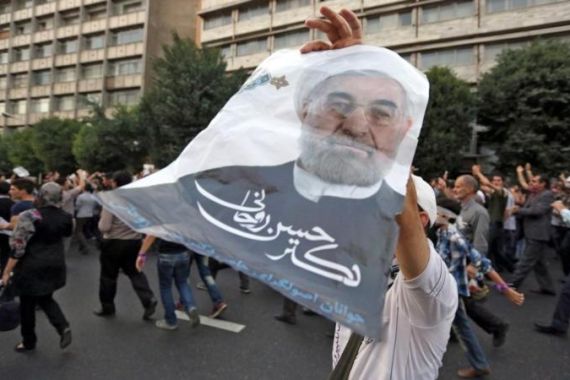Iran’s Rouhani seeks international dialogue
President-elect says country needs a cautious foreign policy and a more conciliatory tone over its nuclear programme.

Iran’s president-elect Hassan Rouhani has promised a more conciliatory tone over the country’s nuclear programme, saying Iran needs a cautious approach in its foreign policy.
In a live address on state TV on Saturday, Rouhani said that Iran was after “dialogue and interaction with others from an equal position, based on mutual respect and interests”.
He also warned the country would develop relations with others only if Tehran’s interests were respected.
Al Jazeera’s Soraya Lennie, reporting from Tehran, said Rouhani also warned regional countries not to miscalculate Iran’s power, saying some rival nations were now paying the cost.
“International relations with others are based on respect, mutual interest and equality. We should reduce tensions, increase confidence-building, while keeping our rights and national dignity in consideration.”
Nuclear programme
Rouhani, a former chief nuclear negotiator, spoke about “the difficult situation” the country was in, a likely reference to international sanctions over Iran’s nuclear programme.
“We need to get through this. We need to use wisdom and confident steps.”
Rouhani has said his victory in the June 14 vote has lifted hopes of a thaw in Iran’s antagonistic relations with the West, and a defusing of its nuclear dispute with world powers.
The president-elect has pledged a more conciliatory approach than Mahmoud Ahmadinejad, under whose presidency the country suffered ever more punishing international sanctions.
Regarding the new cabinet, Rouhani said he would name ministers from across the political spectrum.
“The next cabinet will be trans-factional. This government is not obligated to any party or faction, and will choose the most qualified people from all sides and factions, under conditions of moderation and temperance.”
He added he has not made any decisions on the cabinet.
An analyst says Rouhani, a mid-ranking Shia Muslim cleric who has held sensitive security posts since the 1980s, enjoys an insider status and close relationship with theocratic Supreme Leader, Ayatollah Ali Khamenei, and may be able to build bridges between factions to yield reforms.
But Khamenei will retain the final say on policies that most concern world powers, including Iran’s nuclear programme and its support for Syrian President Bashar al-Assad against rebels trying to overthrow him.
Rouhani will take office in early August.